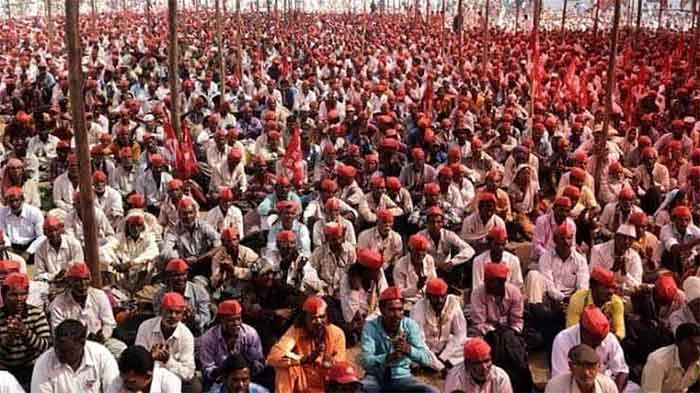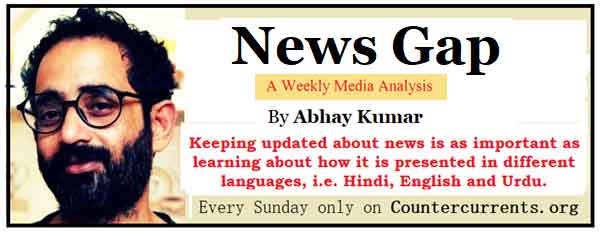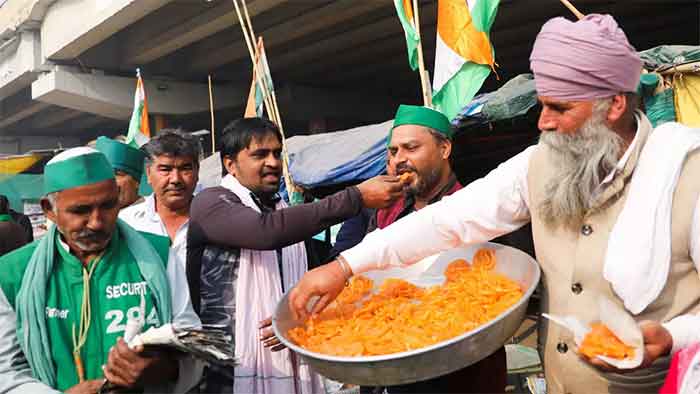
The Farm Bills – which pave the way for private companies to buy farmers’ produce and go for contract-farming- have been vigorously opposed by the opposition parties and the farmers. While covering the issue, the mainstream media, particularly the Hindi press, not only largely ignored the concerns of the opposition parties but also pliantly toed the government’s line. Worse still, it also tried to delegitimize the opposition by calling them unruly and has downplayed farmers’ agitation.
On September 20, the Farm Bills were introduced in the Rajya Sabha, the Upper house of Parliament. The opposition leaders asked for a division (recorded vote); but the deputy Chairman Harivansh Narayan Singh turned it down and went for a voice vote. One of the possible reasons for the reluctance of the Chairman to accept opposition leaders’ demand was the fear of lack of support for these unpopular Farms Bills. Even ‘the old ally’ of BJP, Shiromani Akali Dal, had quit the government, calling the Bills “lethal and disastrous for the already beleaguered farmers”. The opposition members rushed to the Chairman and lodged their protest.
The opposition had also demanded that the Farm Bills – the Farmers’ Produce Trade and Commerce (Promotion and Facilitation) Bill, 2020, the Farmers’ (Empowerment and Protection) Agreement of Price and the Assurance and Farm Services Bill, 2020– should be sent to a select committee of the House. However, the route to deliberation and consultation was not taken up and the Bills were declared passed by a voice vote. Afterwards, eight of the protesting opposition members were suspended, accusing them of creating a ‘ruckus’ in the Parliament.
The government’s narrative that the opposition members had created a ruckus in the Parliament and lowered its dignity was uncritically peddled by the media. For example, Dainik Jagran (National, September 21, 2020, p. 1) ran its front-page lead story with the following headline: “Political impasse: Decorum in Rajya Sabha violated” (Siyasi rar, Rajya Sabha men sabhi maryadayen tar-tar). Rashtriya Sahara (New Delhi, September 21, 2020, p. 1) had an almost similar headline: “Decorum violated in Rajya Sabha” (Rajya Sabha men maryada tar tar). Hindustan (September 21, 2020, p. 1) was also not different: “Parliament’s decorum fails, Farm Bills passed” (Sansad ki maryada fail, Krishi bill pass). Pioneer (Hindi, New Delhi, September 21, 2020, p. 1), Haribhoomi (New Delhi, September 21, 2020, p. 1), Rajasthan Patrika (September 21), similarly, depicted the opposition as villain.
In its reporting Dainik Jagran (National, September 21, 2020, p. 1) accused the opposition parties of indulging in unruly behaviour. It did, however, not raise a point as to why the Chairman did not accept the opposition members’ demand to go for a division of vote. In its opening sentences Dainik Jagran wrote, “Scuffle, breaking of mike, tearing off rule books, commotion. This was not a scene of a fight among students at school, college and hostel but it was a scene at the Upper House of Parliament, i.e., the Rajya Sabha. When the historic Farm Bills for agricultural reforms were introduced on Sunday, the House, during a discussion on two legislations, was witness to shameful scene”. While the Hindi daily published another statement in favour of the Farm Bills, it was reluctant to cover the views of the opposition.
The reporting of the Urdu newspapers, on the other hand, was less slanted than that of the Hindi newspapers. For example, Siasat (Hyderabad, September 21, 2020, p. 1) ran a straight headline “Uproar over the presence of suspension of 8 Rajya Sabha members” (Rajya Sabhaa men 8 muattal arkan ki maujudgi par hangama”. Inquilab (Mumbai, September 21, 2020, p. 1), in its front-page lead headline, wrote “Farm Bills passed, Strong opposition of the opposition parties, murder of democracy termed” (Zaryi bill pass, opposition ka sakht ahtejaj, jamhoriyat ka qatal qrar diya).
Like the Urdu dailies, the English press, avoided brazenly following government’s position. The Hindustan Times (New Delhi, September 21, 2020, p. 1), in its lead story, wrote “Stormy Sunday in House as 2 farm bills go through”. The Times of India (New Delhi, September 21, 2020, p. 1), similarly, ran a similar headline: “Government pushes through farm bills amid opposition charges of foul play”. The Indian Express (New Delhi, September 21, 2020, p. 1), however, was pro-government in its reporting as it hails the passing of “crucial” farm bills. In its front-page lead story titled “Crucial farm reforms through, trail of anger, discord in House”, The Indian Express wrote in the opening paragraph, “Dismissing opposition objections and pleas, the government pushed through two key farm Bills in Rajya Sabha on Sunday amid unprecedented scenes of chaos, confusion and ruckus”. However, The Telegraph (Kolkata, September 21, 2020, p. 1) was bold enough to take on the government with the following front-page lead headline: “Voice clears farm bills, democracy speechless”.

Remember that agriculture has been in deep crisis with more than 300000 farmers committing suicide in last twenty years, according to Alf Gunvald Nilsen who wrote an article in EPW (December 21, 2018). Apart from increase in fuel prices, fertilisers, coupling with ever decrease in wages, demonetisation, Nilsen identifies neoliberal policies, leading to withdrawal of the state in investing in agricultural sector as well as withdrawal of trade protection, as a responsible cause for agrarian crisis. The Farm Bills, passed on Sunday and become a law, will further accelerate the process of neo-liberal policies and aggravate the conditions of farmers. That is why the farmers launched the national-wide protests on Friday. The mainstream media, instead of articulating the interests of the famers and workers, is complicit in state machinations and corporate interests.
(Abhay Kumar is a Ph.D. from JNU. He is broadly interested in Minority and Social Justice. Earlier, he held a Post-Graduate Diploma in English Journalism from the Indian Institute of Mass Communication, New Delhi, and worked as a Delhi-based reporter with The Indian Express. You may write to him at [email protected]).
SIGN UP FOR COUNTERCURRENTS DAILY NEWSLETTER













































